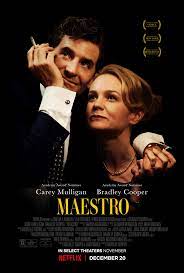Review of the film Maestro
The Film Maestro is the biography of a groundbreaking artist is told by Maestro Bradley Cooper in the most conventional manner imaginable: following the formulaic plot points and clichés of a typical biopic. Cooper made a technically stunning but emotionally taxing picture as the renowned conductor and composer Leonard Bernstein, in which he also stars. This occurred, now this took place, then this transpired in the “Spotlight” screenplay he collaborated on with Josh Singer. In the end, it makes the same mistake as most biopics, particularly prestige productions aiming for big awards: It seems shallow since it covers such a large portion of a renowned person’s life.

Still, you need to witness it. Although it may seem paradoxical, “Maestro” is really worth seeing because of how consistently magnificent it is from an artistic standpoint. As Bernstein’s life progresses over the course of forty or so years, the photography, outfits, and set design all get more expressive and accurate. Cooper, in his role as cinematographer, makes a strong effort to transport you to several time periods, starting with the 1940s and continuing through each succeeding one.
Photographer Matthew Libatique, who was nominated for an Oscar for his work on Bradley Cooper’s first movie, “A Star Is Born,” does stunning work in high-contrast black and white and Academy proportion, illuminating a deserted stage with only one light bulb. Carey Mulligan, who plays Felicia Montealegre, Bernstein’s future wife, takes a stunningly realistic shot as she proceeds up the street from a nighttime bus stop to the party where she would eventually meet bernstein for the very first time. Scenes from the 1960s and 1970s, with their vivid Technicolor, have their own lively charm. The plot moves thrillingly across space and time, thanks to editor Michelle Tesoro’s clever transitions.

The camera moves deftly over the soloists, chorus, and orchestra as the symphony engulfs him and reverberates throughout the huge building. It is the peak of Bernstein’s ecstasy; he is impassioned and ecstatic with sweat. This long, cathartic sequence is better experienced with the greatest possible visual and sound, but the entire film is worthwhile to see in theaters before it becomes available on Netflix on December 20.
Although Bernstein’s music is interwoven (including a humorous usage of the prologue from “West Side Story” amid a marital strife), we never get a good sense of who he is as a man or a composer. Outside of the exclusive realm of classical music, his reputation as a mythical figure and cultural titan in the United States during the 1950s and 1960s knows no bounds. However, as spectators, we are also kept at a remove by the performative character of Bernstein’s life, being a homosexual guy who is secretly gay.
Despite the complexity of Lenny and Felicia’s relationship, “Maestro” seldom ever goes behind the surface. Cooper, the filmmaker, astutely allows the couple’s disputes and the sequences when they become deeply in love to unfold in lengthy, single takes, capturing the actors’ contagious chemistry. Their love is real, and Mulligan is fantastic on several occasions, taking Felicia’s depiction to new heights that go beyond the stereotypical “woman behind the man” trope. Still, the Costa Rican-Chilean actress is often shadowed by Bernstein. In one scene, she stands in wings as her spouse performs, his gigantic figure engulfing her like a monster.

Much has been said about Cooper’s choice to use sophisticated prosthetics to further complete his transition into Bernstein, in reference to the movie’s superficial character. Since Cooper isn’t Jewish, the big nose especially has caused confusion. (Bernstein’s offspring have spoken out in favor of the decision.) Makeup artist Kazu Hiro, who obtained Oscars for his work on “The Darkest Hour” (in which Gary Oldman played Winston Churchill) and “Bombshell” (in which Charlize Theron played Megyn Kelly), does an excellent job here, particularly during Bernstein’s brief cameos as a 70-year-old male.
However, there is an event at the end of the movie that is deserving of criticism. The frame has grown to include a wider area in the late 1980s. Coming soon to theaters near you. Premiering on Netflix on 20th of December.

